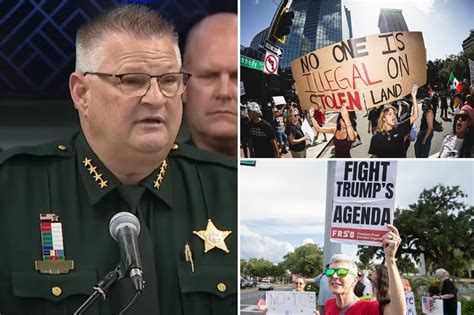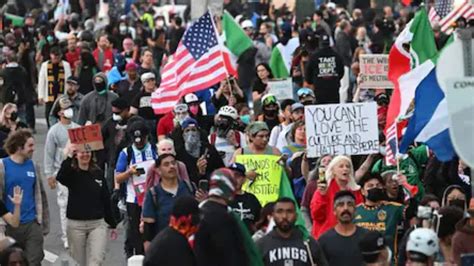
A Florida sheriff issued a stark warning to potential protesters: engage in violence, and face deadly consequences. Polk County Sheriff Grady Judd, during a press conference on Monday, declared, “If you try to burn someone’s house down, or attack them, we are going to shoot you. I’m not going to stand by and watch people be victimized.” His comments followed recent protests across the nation, some of which turned violent.
Sheriff Judd’s forceful message underscores the tension surrounding demonstrations and law enforcement’s response to them, particularly in the context of ongoing debates about policing and civil liberties. While proponents argue such rhetoric is necessary to deter violence and maintain order, critics express concerns about potential escalations and the chilling effect on legitimate protest.
The sheriff’s remarks came during a press conference unrelated to protest activity but were prompted by a reporter’s question about his stance on potential unrest. Judd emphasized that peaceful protest is a protected right, but violence and property destruction will not be tolerated. “I want to be real clear: We’re going to protect the First Amendment. If you peacefully protest, that’s your right. But… when you commit a crime, we’re going to lock you up.”
He further clarified his position, stating, “We are highly trained. We’re heavily armed. We’re going to protect the good people in this community. And if you try to do anything that hurts them or destroys their property, we’re going to lock you up. And if you force us to take deadly action, we’re going to do that.”
Judd’s uncompromising stance is not new. He has a history of making strong statements regarding law enforcement and public safety. His supporters often point to his efforts to reduce crime and protect the community, while detractors argue his rhetoric is overly aggressive and contributes to a climate of fear.
The national climate surrounding protests has been volatile. Following several high-profile incidents of police brutality, demonstrations have erupted across the country, with some instances involving clashes between protesters and law enforcement, as well as property damage and looting. These events have fueled debates about the role of police, systemic racism, and the limits of free speech.
Sheriff Judd’s comments have drawn both support and criticism. Supporters argue that his tough stance sends a clear message that violence will not be tolerated, while critics contend that such rhetoric could escalate tensions and lead to unnecessary use of force. Some civil rights advocates have expressed concern that Judd’s words could discourage legitimate protest and chill freedom of expression.
The potential for escalation is a significant concern in any situation involving protests and law enforcement. The use of force by police can inflame tensions and lead to further unrest, while the failure to respond to violence can embolden those who seek to disrupt public order. Finding the right balance between protecting public safety and upholding constitutional rights is a complex challenge for law enforcement agencies across the country.
The legal framework governing protests in the United States is rooted in the First Amendment, which guarantees the rights to freedom of speech, assembly, and the press. However, these rights are not absolute and can be subject to reasonable restrictions. For example, the government can impose time, place, and manner restrictions on protests to protect public safety and maintain order.
The Supreme Court has established a framework for analyzing the constitutionality of such restrictions, balancing the government’s interest in maintaining order with the individual’s right to express their views. Restrictions on protests must be content-neutral, narrowly tailored to serve a significant government interest, and leave open ample alternative channels for communication.
The use of force by law enforcement during protests is also subject to legal constraints. The Fourth Amendment protects individuals from unreasonable searches and seizures, and the use of excessive force by police can violate this right. The Supreme Court has held that the reasonableness of force must be judged from the perspective of a reasonable officer on the scene, taking into account the totality of the circumstances.
Sheriff Judd’s remarks highlight the ongoing tension between the right to protest and the need to maintain public order. While his supporters argue that his tough stance is necessary to deter violence, critics worry that it could chill legitimate protest and lead to unnecessary use of force. The challenge for law enforcement agencies is to strike a balance between protecting public safety and upholding constitutional rights.
The broader context of Sheriff Judd’s statement involves the national debate on police reform and accountability. Calls for reform have intensified following several high-profile incidents of police brutality, with many demanding greater transparency, accountability, and community involvement in policing. Some activists are advocating for defunding or abolishing the police, while others are calling for reforms such as body cameras, de-escalation training, and independent investigations of police misconduct.
Sheriff Judd has been a vocal opponent of many of these reforms, arguing that they would undermine law enforcement’s ability to protect the public. He has defended the use of force in certain circumstances and has criticized what he sees as unwarranted attacks on police officers. His stance reflects a broader divide within law enforcement and the public regarding the future of policing in America.
The impact of Sheriff Judd’s rhetoric on the community is a matter of ongoing debate. Supporters argue that his tough stance deters crime and makes residents feel safer, while critics contend that it alienates minority communities and contributes to a climate of fear. Studies have shown that police rhetoric can have a significant impact on public perceptions of crime and safety, and that it can also affect the relationship between law enforcement and the community.
Moving forward, it is essential to foster dialogue and understanding between law enforcement and the communities they serve. This requires open communication, mutual respect, and a willingness to address concerns about police misconduct and accountability. It also requires a commitment to upholding constitutional rights and ensuring that all members of the community are treated fairly and equitably.
Sheriff Judd’s “We Will Kill You” warning represents a flashpoint in the ongoing debate about policing, protest, and the balance between public safety and individual rights. It underscores the deep divisions within American society and the urgent need for constructive dialogue and reform. The way forward requires a commitment to both upholding the law and protecting the fundamental freedoms that are essential to a democratic society. Expanded Context and Analysis
Sheriff Judd’s comments, while direct and seemingly devoid of nuance, must be understood within the broader context of his established public persona and the socio-political climate in which they were delivered. His rhetoric is consistent with a tough-on-crime approach that has defined his tenure as Sheriff of Polk County. This approach often resonates with a segment of the population that prioritizes law and order above other considerations. However, it simultaneously alienates those who believe such pronouncements contribute to a culture of fear and potential overreach by law enforcement.
The statement cannot be divorced from the history of racial tensions and police brutality in the United States. The Black Lives Matter movement, fueled by a series of high-profile killings of unarmed Black individuals by police officers, has brought renewed scrutiny to police practices and the disproportionate impact of the criminal justice system on minority communities. Against this backdrop, Judd’s “We Will Kill You” warning can be interpreted as a threat directed specifically at those protesting perceived injustices, further exacerbating existing distrust between law enforcement and certain segments of the population.
The First Amendment’s protections for freedom of speech and assembly are not absolute. The Supreme Court has recognized that the government can impose reasonable restrictions on these rights to maintain public order and safety. However, any such restrictions must be narrowly tailored and content-neutral, meaning they cannot be based on the message being conveyed by the protesters. Sheriff Judd’s statement raises concerns about whether it could be interpreted as an attempt to chill protected speech, particularly if individuals fear that expressing their views could lead to violent retaliation by law enforcement.
The issue of escalation is paramount in any protest situation. Law enforcement’s response to protests can either de-escalate tensions or exacerbate them. The use of force, even when legally justified, can inflame emotions and lead to further unrest. Conversely, a failure to respond to violence or property destruction can embolden those who seek to disrupt public order. Sheriff Judd’s statement, with its explicit threat of deadly force, raises the risk of escalating tensions and creating a self-fulfilling prophecy, where protesters are more likely to resort to violence out of fear or anger.
The debate surrounding police reform is complex and multifaceted. Some advocate for systemic changes, such as defunding the police and reinvesting resources in community-based programs. Others favor more incremental reforms, such as body cameras, de-escalation training, and independent investigations of police misconduct. Sheriff Judd has consistently resisted many of these reforms, arguing that they would undermine law enforcement’s ability to protect the public. His stance reflects a broader divide within the law enforcement community about the best way to address issues of police brutality and racial bias.
The effectiveness of tough-on-crime rhetoric is a subject of ongoing debate. Proponents argue that it deters crime and makes residents feel safer. Critics contend that it alienates minority communities, contributes to mass incarceration, and does little to address the underlying causes of crime. Studies on the impact of policing strategies have yielded mixed results, with some showing that aggressive tactics can lead to short-term reductions in crime, while others suggest that community-oriented policing is more effective in the long run.
The role of community engagement in policing is increasingly recognized as essential. Building trust between law enforcement and the communities they serve requires open communication, transparency, and a willingness to address concerns about police misconduct. Community policing models emphasize collaboration between police officers and residents to identify and solve problems, rather than relying solely on traditional law enforcement tactics. Sheriff Judd’s statement, with its lack of emphasis on community engagement, may undermine efforts to build trust and cooperation between law enforcement and the community in Polk County.
The legal standards governing the use of force by law enforcement are complex and vary depending on the circumstances. Generally, police officers are authorized to use force only when it is reasonably necessary to protect themselves or others from imminent harm. The use of deadly force is justified only when an officer has a reasonable belief that they or another person is facing an imminent threat of death or serious bodily injury. Sheriff Judd’s statement, with its broad declaration that protesters will be shot if they attack someone or burn their house down, may not accurately reflect the legal limitations on the use of deadly force.
The potential for misinterpretation of Sheriff Judd’s statement is significant. His words could be interpreted as a blanket authorization for police officers to use deadly force against protesters, even in situations where such force is not legally justified. This could lead to tragic consequences and undermine public trust in law enforcement. It is crucial that law enforcement agencies provide clear and consistent guidance to officers on the legal standards governing the use of force, and that they hold officers accountable for any violations of those standards.
The importance of de-escalation training for law enforcement cannot be overstated. De-escalation techniques can help officers resolve conflicts peacefully and avoid the use of force whenever possible. De-escalation training typically involves teaching officers how to communicate effectively, assess threats, and use less-lethal alternatives to deadly force. Sheriff Judd’s statement, with its emphasis on the use of deadly force, may undermine efforts to promote de-escalation training and encourage officers to use less-lethal alternatives whenever possible.
The need for independent investigations of police misconduct is essential for maintaining public trust and accountability. When police officers are accused of wrongdoing, it is crucial that those allegations are investigated thoroughly and impartially. Independent investigations can help ensure that officers are held accountable for their actions and that victims of police misconduct receive justice. Sheriff Judd’s statement, with its strong defense of law enforcement, may make it more difficult to conduct independent investigations of police misconduct in Polk County.
The long-term consequences of Sheriff Judd’s statement are difficult to predict. It is possible that his words will deter violence and maintain order in Polk County. However, it is also possible that they will alienate minority communities, contribute to a climate of fear, and undermine efforts to build trust between law enforcement and the community. The ultimate impact of his statement will depend on how it is interpreted and acted upon by law enforcement, protesters, and the community as a whole.
Sheriff Judd’s declaration also needs to be considered within the specific context of Florida law and politics. Florida has a history of strong law enforcement and a generally conservative political climate. The state also has “Stand Your Ground” laws that broaden the circumstances under which individuals can use deadly force in self-defense. These factors may contribute to a perception that Sheriff Judd’s statement is consistent with the prevailing legal and political norms in Florida.
However, it is important to recognize that even within Florida, there are diverse viewpoints on policing and criminal justice. Many residents support police reform and accountability, and they may be critical of Sheriff Judd’s tough-on-crime approach. The statement also raises concerns about the potential for racial bias in policing, particularly in light of Florida’s history of racial discrimination.
The role of the media in shaping public perceptions of policing is also important. Sheriff Judd’s statement was widely reported by news outlets across the country, and the way in which it was framed may have influenced public opinion. Some media outlets may have emphasized the perceived threat of violence and the need for law enforcement to maintain order, while others may have focused on the potential for police overreach and the chilling effect on freedom of expression.
The international context of Sheriff Judd’s statement should not be overlooked. The United States has faced criticism from international human rights organizations for its policing practices, particularly the use of force against protesters. Sheriff Judd’s statement may further damage the United States’ reputation as a defender of human rights and civil liberties.
In conclusion, Sheriff Judd’s “We Will Kill You” warning is a complex and controversial statement that must be understood within the broader context of his established public persona, the socio-political climate, the legal framework governing protests, and the ongoing debate about police reform. It raises concerns about the potential for escalation, the chilling effect on freedom of expression, and the need for accountability in policing. The long-term consequences of his statement will depend on how it is interpreted and acted upon by law enforcement, protesters, and the community as a whole. A more nuanced approach that prioritizes de-escalation, community engagement, and accountability would be more effective in promoting public safety and upholding constitutional rights. Frequently Asked Questions (FAQ)
-
What exactly did Sheriff Judd say? Sheriff Grady Judd stated, “If you try to burn someone’s house down, or attack them, we are going to shoot you. I’m not going to stand by and watch people be victimized.” He made this declaration during a press conference while responding to a reporter’s question about his stance on potential unrest, emphasizing his department’s readiness to respond to violence. He also stated, “We are highly trained. We’re heavily armed. We’re going to protect the good people in this community. And if you try to do anything that hurts them or destroys their property, we’re going to lock you up. And if you force us to take deadly action, we’re going to do that.”
-
Was Sheriff Judd responding to a specific event or protest when he made this statement? While the press conference wasn’t directly about a specific protest, the statement was prompted by a reporter’s question about his views on potential unrest. Sheriff Judd addressed concerns surrounding recent protests across the nation, some of which have turned violent, using the opportunity to clarify his stance on violence during protests in Polk County.
-
Does Sheriff Judd’s statement violate the First Amendment rights of protesters? The First Amendment protects the rights to freedom of speech and assembly, but these rights are not absolute. The government can impose reasonable restrictions on protests to maintain public order and safety. Sheriff Judd emphasized that peaceful protest is a protected right, but violence and property destruction will not be tolerated. The legality of any specific action taken by law enforcement would depend on the specific circumstances and whether it complies with constitutional standards.
-
What has been the reaction to Sheriff Judd’s statement? The reaction has been divided. Supporters argue that his tough stance sends a clear message that violence will not be tolerated, while critics contend that such rhetoric could escalate tensions and lead to unnecessary use of force. Civil rights advocates have expressed concern that Judd’s words could discourage legitimate protest and chill freedom of expression.
-
What are the legal standards for police use of force during protests? The Fourth Amendment protects individuals from unreasonable searches and seizures, including the use of excessive force by police. The reasonableness of force must be judged from the perspective of a reasonable officer on the scene, taking into account the totality of the circumstances. Deadly force is generally justified only when an officer has a reasonable belief that they or another person is facing an imminent threat of death or serious bodily injury. State and local laws may provide additional restrictions on the use of force.









